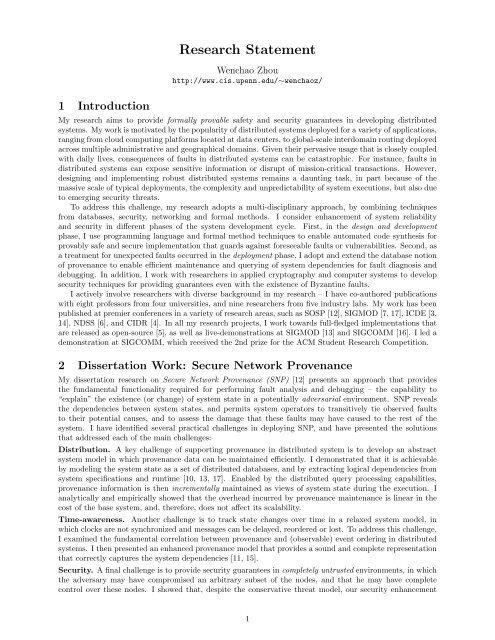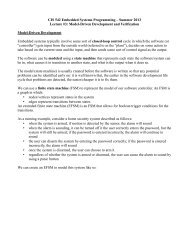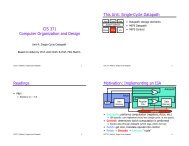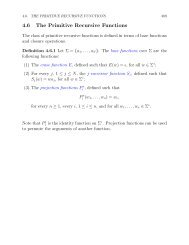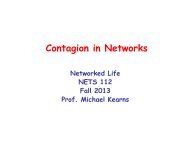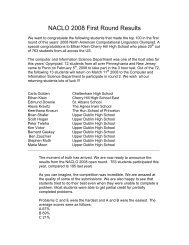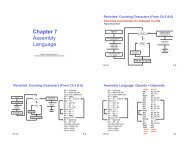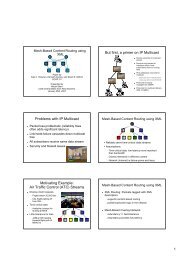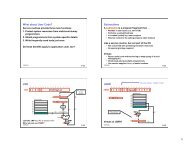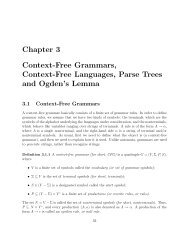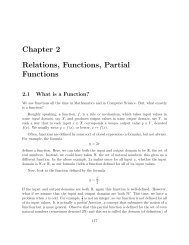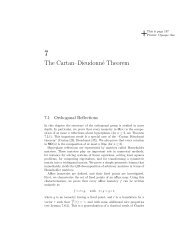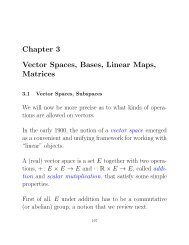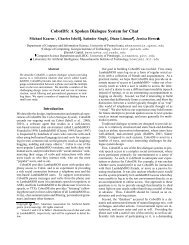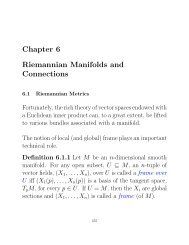Research Statement - Computer & Information Science
Research Statement - Computer & Information Science
Research Statement - Computer & Information Science
You also want an ePaper? Increase the reach of your titles
YUMPU automatically turns print PDFs into web optimized ePapers that Google loves.
1 Introduction<br />
<strong>Research</strong> <strong>Statement</strong><br />
Wenchao Zhou<br />
http://www.cis.upenn.edu/∼wenchaoz/<br />
My research aims to provide formally provable safety and security guarantees in developing distributed<br />
systems. My work is motivated by the popularity of distributed systems deployed for a variety of applications,<br />
ranging from cloud computing platforms located at data centers, to global-scale interdomain routing deployed<br />
across multiple administrative and geographical domains. Given their pervasive usage that is closely coupled<br />
with daily lives, consequences of faults in distributed systems can be catastrophic. For instance, faults in<br />
distributed systems can expose sensitive information or disrupt of mission-critical transactions. However,<br />
designing and implementing robust distributed systems remains a daunting task, in part because of the<br />
massive scale of typical deployments, the complexity and unpredictability of system executions, but also due<br />
to emerging security threats.<br />
To address this challenge, my research adopts a multi-disciplinary approach, by combining techniques<br />
from databases, security, networking and formal methods. I consider enhancement of system reliability<br />
and security in different phases of the system development cycle. First, in the design and development<br />
phase, I use programming language and formal method techniques to enable automated code synthesis for<br />
provably safe and secure implementation that guards against foreseeable faults or vulnerabilities. Second, as<br />
a treatment for unexpected faults occurred in the deployment phase, I adopt and extend the database notion<br />
of provenance to enable efficient maintenance and querying of system dependencies for fault diagnosis and<br />
debugging. In addition, I work with researchers in applied cryptography and computer systems to develop<br />
security techniques for providing guarantees even with the existence of Byzantine faults.<br />
I actively involve researchers with diverse background in my research – I have co-authored publications<br />
with eight professors from four universities, and nine researchers from five industry labs. My work has been<br />
published at premier conferences in a variety of research areas, such as SOSP [12], SIGMOD [7, 17], ICDE [3,<br />
14], NDSS [6], and CIDR [4]. In all my research projects, I work towards full-fledged implementations that<br />
are released as open-source [5], as well as live-demonstrations at SIGMOD [13] and SIGCOMM [16]. I led a<br />
demonstration at SIGCOMM, which received the 2nd prize for the ACM Student <strong>Research</strong> Competition.<br />
2 Dissertation Work: Secure Network Provenance<br />
My dissertation research on Secure Network Provenance (SNP) [12] presents an approach that provides<br />
the fundamental functionality required for performing fault analysis and debugging – the capability to<br />
“explain” the existence (or change) of system state in a potentially adversarial environment. SNP reveals<br />
the dependencies between system states, and permits system operators to transitively tie observed faults<br />
to their potential causes, and to assess the damage that these faults may have caused to the rest of the<br />
system. I have identified several practical challenges in deploying SNP, and have presented the solutions<br />
that addressed each of the main challenges:<br />
Distribution. A key challenge of supporting provenance in distributed system is to develop an abstract<br />
system model in which provenance data can be maintained efficiently. I demonstrated that it is achievable<br />
by modeling the system state as a set of distributed databases, and by extracting logical dependencies from<br />
system specifications and runtime [10, 13, 17]. Enabled by the distributed query processing capabilities,<br />
provenance information is then incrementally maintained as views of system state during the execution. I<br />
analytically and empirically showed that the overhead incurred by provenance maintenance is linear in the<br />
cost of the base system, and, therefore, does not affect its scalability.<br />
Time-awareness. Another challenge is to track state changes over time in a relaxed system model, in<br />
which clocks are not synchronized and messages can be delayed, reordered or lost. To address this challenge,<br />
I examined the fundamental correlation between provenance and (observable) event ordering in distributed<br />
systems. I then presented an enhanced provenance model that provides a sound and complete representation<br />
that correctly captures the system dependencies [11, 15].<br />
Security. A final challenge is to provide security guarantees in completely untrusted environments, in which<br />
the adversary may have compromised an arbitrary subset of the nodes, and that he may have complete<br />
control over these nodes. I showed that, despite the conservative threat model, our security enhancement<br />
1
in SNP still provides strong, provable guarantees [12]: it ensures that an observable symptom of a fault or<br />
an attack can always be traced to a specific event—passive evasion or active misbehavior—on at least one<br />
faulty node, even when the adversary attempts to prevent this.<br />
To demonstrate SNP’s practicality and generality, I have applied it to a variety of different systems,<br />
including the Internet’s interdomain routing system, the Chord distributed hash table, and the Hadoop<br />
MapReduce system. My evaluation have demonstrated that SNP is able to detect a number of different<br />
problems that had been previously described in the literature, and that SNP is practical, both in terms of<br />
its run-time overhead and in terms of the effort required to deploy it.<br />
3 Generating Formally Safe and Secure Implementations<br />
An approach that complements the reactive fault analysis is the development of formal analysis frameworks<br />
and domain specific languages that automates the process of generating formally safe and secure implementations.<br />
Here, the goal is to use formal tools and programming language techniques to generate implementations<br />
that maintain specified invariants throughout system executions. I have explored this general idea in the<br />
following two settings:<br />
Formally Safe Routing (FSR). The FSR [8] system automates the process of safety (i.e., convergence)<br />
analysis for routing configurations using a constraint solver, and compiles the verified configuration into<br />
distributed implementations. In a recent prototype demonstration [16], FSR was used to detect problems in<br />
an autonomous system’s iBGP configuration (using realistic topologies), and to prove sufficient conditions<br />
for BGP safety.<br />
Secure Network Datalog (SeNDlog). SeNDlog [14] unifies logic-based access languages and distributed<br />
query languages for declarative networks. Given its root in logic-based languages, SeNDlog allows rigorous<br />
reasoning and static verification for safety and secure properties (e.g., authenticity of communications). It<br />
bridges the gap between formally verified specifications and implementation in practice using a provably<br />
correct compilation process.<br />
In collaboration with LogicBlox Inc., I further extended SeNDlog to support extensible trust management<br />
[4], where various security constructs can be customized and composed in a declarative fashion. It<br />
supports a variety of security primitives (e.g., speaks-for and restricted delegation) for authentication, integrity<br />
and confidentiality, which enables a wide range of distributed applications with customizable security<br />
policies, while still benefiting from its roots in logic-based languages.<br />
As a feasibility demonstration of my methods for developing secure distributed systems in practice, the<br />
Application-Aware Anonymity (A 3 ) [6] system provides an extensible platform for applications to deploy<br />
anonymity-based services on the Internet. A 3 uses SeNDlog for customizing how relays in a routing path<br />
should be selected, and how the routing path should be instantiated. It allows applications to tailor the<br />
anonymity properties and performance characteristics according to their communication requirements.<br />
4 Future Work<br />
Below, I briefly outline my future research agenda, describing short-term extensions to my dissertation work<br />
as well as my longer-term research plan.<br />
4.1 Extensions to Dissertation<br />
SNP automates fault diagnosis and debugging, by systematically maintaining and querying state dependencies<br />
as the system execution progresses. I intend to further improve its usability to encourage its adoption<br />
in academia and industrial development settings.<br />
One important aspect for future research is to enhance the “readability” of the returned provenance results.<br />
Provenance information could be overwhelmingly large in systems with complex dependency logic. To<br />
address this challenge, I intend to explore the following two complementary approaches: the first approach<br />
focuses on developing an expressive yet easy-to-use interface (e.g., a SQL-like declarative query language tailored<br />
for the SNP model), for users to annotate and prune provenance data based on a customizable pattern;<br />
alternatively, the size and complexity of provenance information can be controlled by introducing layering<br />
into the provenance system, in which case provenance data can be captured at a variety of granularities, and<br />
be interactively expanded.<br />
SNP mainly explores the authenticity and integrity aspects of security in provenance systems. I plan<br />
to extend the exploration to their counterparts, privacy and confidentiality. It is intriguing to study the<br />
2
tension between privacy and verifiability, two seemingly contradictory properties. As a first step, the private<br />
and verifiable routing (PVR) [1] provides initial evidence that strong privacy guarantees can be achieved<br />
in the interdomain routing, where the functionality of each node is well-restricted to route selection and<br />
advertisement based on a customized ranking function. I intend to further understand the performance<br />
implications or limits when extending the guarantees to more general systems.<br />
4.2 Looking Beyond<br />
Looking beyond my dissertation work, my long-term research goal is to facilitate the development of provably<br />
secure and reliable distributed systems. Specifically, I intend to accomplish this by enhancing the iterative<br />
development cycle of distributed systems, with research advances in the following aspects:<br />
Rigorous verification on design and vulnerabilities. Formal verification provides sound and complete<br />
guarantees by checking that a certain set of properties holds in all possible execution traces. My current<br />
research focuses on static analysis, by leveraging prove-by-construction capability enabled by logic-based<br />
programming languages. I intend to extend the exploration to dynamic verification techniques [2], such<br />
as model checking, for verifying more complex properties and performing “what-if” analysis to discover<br />
potential vulnerabilities given certain assumptions on the attack model.<br />
Systematic fault diagnosis and recovery. SNP can be used to systematically diagnose faults, where<br />
“explanations” of a suspicious symptom are compiled as a set of state dependencies that recursively trace<br />
back to the root causes. As the basis for inferring state dependencies, the high-level dependency logic<br />
(captured as derivation rules in SNP) is of critical importance. To generalize and further automate the<br />
extraction of such dependency logic from a target application, one potential avenue that I intend to explore<br />
is to employ programming language techniques that perform static (or dynamic) analysis on the information<br />
flow of the target system.<br />
In addition to debugging, one intriguing direction is the use of SNP for provenance-based recovery. SNP<br />
maintains sufficient information to reproduce the system execution trace individually for each node. This<br />
brings opportunities to undo the damages caused by an exposed system fault, by applying the inverse<br />
operations in the reverse order. For example, a mistakenly deleted system state can be restored by the<br />
corresponding insertion. In addition, provenance keeps the dependency information and thus allows minimal<br />
recovery, i.e., the recovery only impacts the nodes that are actually affected by the fault.<br />
Provenance-driven invariant generation. One important challenge in formal verification is for system<br />
designers to discover the safety properties (or invariants). The quality of these safety properties directly<br />
affects the quality of the verification results, however, there lacks a systematic approach to extract the<br />
safety properties, and the process largely relies on manual efforts today. To address this problem, I am<br />
interested in feeding the design bugs or security vulnerabilities exposed in fault diagnosis (as hints for the<br />
safety properties) to refine the invariants in the design and development phase.<br />
5 Other Work<br />
In addition to the research work around the general theme of developing provable secure and reliable distributed<br />
systems, I have worked on a variety of other projects in both academic and industrial settings. I<br />
provide a brief summary of each project:<br />
Query optimization in streaming systems. With a proliferation of edge devices such as smartphones,<br />
and the global availability of Cloud computing resources, the Cloud-Edge topology – where multiple edge<br />
devices are inter-connected through the Cloud – is becoming commonplace. Edge devices generate real-time<br />
data such as GPS location, battery consumption, etc. There exists a broad class of distributed applications<br />
that involve data correlation across multiple edge devices and the Cloud.<br />
With collaborators from Microsoft <strong>Research</strong>, I proposed the RACE (Real-time Applications over Cloud-<br />
Edge topologies) system to support such applications [9]. The key challenge in RACE lies in the generation<br />
of a distributed query plan that optimizes global overhead. To address this challenge, I developed novel<br />
operator placement algorithms that are provably optimal. An evaluation over real datasets indicated that<br />
RACE is highly scalable, and is orders of magnitude more efficient than current placement strategies.<br />
Cloud serving and batch systems. Cloud data management systems can largely be divided into batchoriented<br />
and serving-oriented systems. However, a number of applications (e.g., targeted advertising) cannot<br />
be cleanly mapped to one of these types of systems, but instead require hybrid functionality. In combining<br />
batch and serving systems [7], my collaborators at Yahoo! <strong>Research</strong> and I identified several key areas where<br />
3
the fundamental properties, such as failure and recovery granularity, performance optimization metrics,<br />
and consistency model, of each system are mismatched. Techniques are then introduced to mitigate these<br />
conflicts, and to provide hybrid functionality in an efficient manner.<br />
Distributed monitoring and checking. In addition to the research on the static verification enabled<br />
by the logic-based languages (Section 3), I demonstrated that runtime monitoring and checking are also<br />
achievable within the same framework. I have conceptualized and developed DMaC [18], a system that<br />
monitors and checks running systems against formally specified properties in a declarative fashion, where<br />
high-level safety properties are automatically compiled from platform-independent formal specifications into<br />
distributed monitoring queries for execution.<br />
References<br />
[1] Alexander J. T. Gurney, Andreas Haeberlen, Wenchao Zhou, Micah Sherr, and Boon Thau Loo. Having your<br />
Cake and Eating it too: Routing Security with Privacy Protections. In Proc. ACM SIGCOMM Workshop on<br />
Hot Topics in Networks (HotNets), 2011.<br />
[2] Limin Jia, Chen Chen, Sangeetha A. Jyothi, Wenchao Zhou, Suyog Mapara, and Boon Thau Loo. Towards<br />
a Secure and Verifiable Future Internet. In Proc. Workshop on Off the Beaten Track (OBT), co-located with<br />
POPL, 2012.<br />
[3] Mengmeng Liu, Nicholas Taylor, Wenchao Zhou, Zachary Ives, and Boon Thau Loo. Recursive Computation<br />
of Regions and Connectivity in Networks. In Proc. IEEE Int. Conf. on Data Engineering (ICDE), 2009. Best<br />
Papers of ICDE 2009.<br />
[4] William R. Marczak, David Zook, Wenchao Zhou, Molham Aref, and Boon Thau Loo. Declarative Reconfigurable<br />
Trust Management. In Proc. Biennial Conf. on Innovative Data Systems <strong>Research</strong> (CIDR), 2009.<br />
[5] RapidNet. RapidNet Declarative Networking Engine. http://netdb.cis.upenn.edu/rapidnet/.<br />
[6] Micah Sherr, Andrew Mao, William R. Marczak, Wenchao Zhou, Boon Thau Loo, and Matt Blaze. A3:<br />
An Extensible Platform for Application-Aware Anonymity. In Proc. Network and Distributed Systems Security<br />
Symp. (NDSS), 2010.<br />
[7] Adam Silberstein, Russell Sears, Wenchao Zhou, and Brian F. Cooper. A Batch of PNUTS: Experiences<br />
Connecting Cloud Batch and Serving Systems. In Proc. ACM SIGMOD Int. Conf. on Management of Data<br />
(SIGMOD), 2011.<br />
[8] Anduo Wang, Limin Jia, Wenchao Zhou, Yiqing Ren, Boon Thau Loo, Jennifer Rexford, Vivek Nigam, Andre<br />
Scedrov, and Carolyn Talcott. FSR: Formal Analysis and Implementation Toolkit for Safe Inter-domain Routing.<br />
In submission to IEEE/ACM Trans. Networking, 2011.<br />
[9] Wenchao Zhou, Badrish Chandramouli, and Suman Nath. Specification and Optimization of Real-Time Cloud-<br />
Edge Applications. In submission, 2011.<br />
[10] Wenchao Zhou, Eric Cronin, and Boon Thau Loo. Provenance-aware Secure Networks. In Proc. Int. Conf. on<br />
Data Engineering Workshops (NetDB), 2008.<br />
[11] Wenchao Zhou, Ling Ding, Andreas Haeberlen, Zachary Ives, and Boon Thau Loo. Time-aware Provenance<br />
for Distributed Systems. In Proc. USENIX Workshop on Theory & Practice of Provenance (TaPP), 2011.<br />
[12] Wenchao Zhou, Qiong Fei, Arjun Narayan, Andreas Haeberlen, Boon Thau Loo, and Micah Sherr. Secure<br />
Network Provenance. In Proc. ACM Symp. on Operating System Principles (SOSP), 2011.<br />
[13] Wenchao Zhou, Qiong Fei, Shengzhi Sun, Tao Tao, Andreas Haeberlen, Zachary Ives, Boon Thau Loo, and<br />
Micah Sherr. NetTrails: A Declarative Platform for Provenance Maintenance and Querying in Distributed<br />
Systems. In Proc. ACM SIGMOD Int. Conf. on Management of Data (SIGMOD) - Demonstration, 2011.<br />
[14] Wenchao Zhou, Yun Mao, Boon Thau Loo, and Martín Abadi. Unified Declarative Platform for Secure<br />
Networked <strong>Information</strong> Systems. In Proc. IEEE Int. Conf. on Data Engineering (ICDE), 2009.<br />
[15] Wenchao Zhou, Suyog Mapara, Yang Li, Andreas Haeberlen, Zachary Ives, Boon Thau Loo, and Micah Sherr.<br />
TapTrails: Provenance of Changes for Distributed Systems. In submission, 2011.<br />
[16] Wenchao Zhou, Yiqing Ren, Anduo Wang, Limin Jia, Alexander J.T. Gurney, Boon Thau Loo, and Jennifer<br />
Rexford. FSR: Formal Analysis and Implementation Toolkit for Safe Inter-domain Routing. In Proc. ACM<br />
SIGCOMM Int. Conf. on Data Communication (SIGCOMM) - Demonstration, 2011. Runner-up for the<br />
ACM Student <strong>Research</strong> Competition.<br />
[17] Wenchao Zhou, Micah Sherr, Tao Tao, Xiaozhou Li, Boon Thau Loo, and Yun Mao. Efficient Querying and<br />
Maintenance of Network Provenance at Internet-Scale. In Proc. ACM SIGMOD Int. Conf. on Management of<br />
Data (SIGMOD), 2010.<br />
[18] Wenchao Zhou, Oleg Sokolsky, Boon Thau Loo, and Insup Lee. DMaC: Distributed Monitoring and Checking.<br />
In Proc. Int. Conf. on Runtime Verification (RV), 2009.<br />
4


